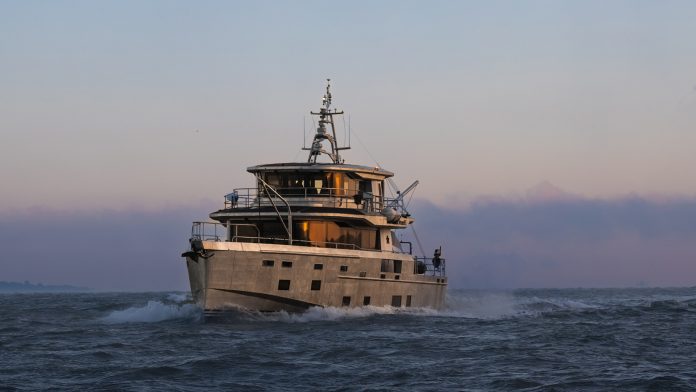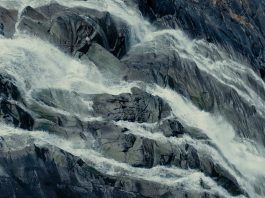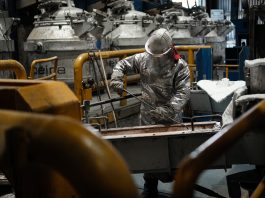Speira’s recycled aluminium alloy offers a sustainable approach to shipbuilding, helping the yachting industry reduce its environmental impact.
The demand for eco-friendly solutions in yacht building is growing. Speira is, therefore, all the more pleased about the Life Cycle Assessment (LCA) certification of VIA Maris Njørdal – a high-strength 5,000 series recycled aluminium alloy used in shipbuilding and the offshore industry.
In collaboration with Water Revolution Foundation (WRF) and external partner Alea Design, a spin-off from the University of Modena Reggio Emilia, the alloy further developed by Speira was analysed in comparison to the previously used solution. The life cycle analysis shows the improved performance of VIA Maris Njørdal compared to VIA Maris 5083. With a 15% higher strength, the innovative reycled aluminium solution enables an up to 15% reduction in the use of materials in shipbuilding.
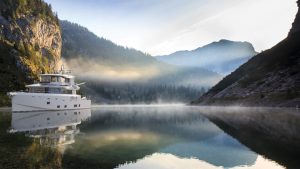
The LCA results are currently being used to create Environmental Product Declarations (EPD) for both VIA Maris 5083 and VIA Maris Njørdal. Speira thus follows the understanding that sustainability and transparency are inseparable and shows how its aluminium sheets impact the environment in ship, yacht, and boat building.
Awwal Idris, Environmental Expert of Water Revolution Foundation, said: “Together with progressive partners like Speira, our foundation is taking impactful steps to reduce the ecological footprint of the yachting industry. Using the rigorous Life Cycle Assessment methodology outlined by ISO 14040, we comprehensively analysed the aluminium used in VIA Maris Njørdal, evaluating its entire journey from raw material extraction to end-of-life disposal and recycling. This assessment confirms that Speira’s aluminium solution surpasses the conventional, business-as-usual standard 5083 alloy, offering better environmental performance as a construction material and supporting more eco-friendly building practices. We’re advancing an environmentally responsible future for the yachting industry and the planet by championing materials that minimise harm to our environment.”
Find the LCA’s summary in Water Revolution Foundation’s Hub of Verified Solutions.
Improving both sustainability and mechanical properties
Based on many years of experience in the production of high-strength 5,000 series alloys, Speira’s VIA Maris products are the perfect solution for applications in the maritime and offshore industry. They offer a more eco-friendly, easy-to-process material with a low CO2 footprint. Yacht builder Arksen from London, for example, is already using Speira’s marine-grade aluminium for its new Explorer yachts.
With the Arksen 85, the company is presenting its first vessel with hybrid propulsion, which is low-maintenance, efficient, and less resource-intensive over its entire life cycle and is set to become part of a planned fleet of more environmentally conscious yachts for marine research and conservation.
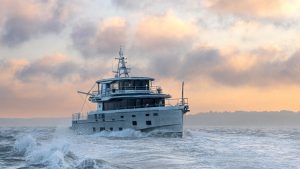
Jim Mair, Technical Director at Arksen, said: “Njørdal is a really exciting product for Arksen. Not only does it have higher mechanical properties than many grades in marine aluminium, but also has a higher recycled content, which is a really key thing for Arksen in our sustainability pathway.” The use of Speira’s alloy is featured in a case study.
Eco-friendly solution for challenging conditions
Another proof point for the VIA Maris Njørdal alloy improving sustainability in shipbuilding is the 30m crew transfer vessel ‘Seacat Columbia’. Designed in partnership with BAR Technologies / Chartwell Marine Ltd and built by Diverse Marine, it features a highly optimised multihull design. It consists of a main hull with two waterjets and a stabilising outrigger – a concept well known from the time of the ancient Polynesian sailors. The main part of the aluminium hull is left unpainted and requires only low maintenance, which contributes to cost-effective operation of the vessel.
BAR Technologies said: “The vessel was designed to address the two most pressing challenges of the offshore wind industry: vessel efficiency – and therefore emissions reduction – and the comfort in transfer. In the first instance, many of the major offshore wind developers and owners are now beginning to look at the fossil fuel consumption in wind farm service vessels.”
The Seacat Columbia aluminium vessel is designed to minimise vessel motion and fuel burn – leading to an average increase in stability across all sea states of up to 70% and a reduction in total emissions of 30% over a typical operational profile.
Additionally, BAR Technologies states the highly innovative vessel is able to operate in more challenging conditions than the current catamaran designs and offshore wind turbines may be serviced over a greater number of sea states, ensuring wind farm owners have more opportunities to better and more cost-effectively provide turbine maintenance.
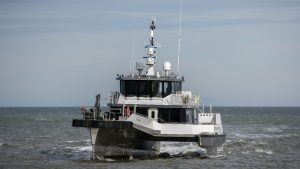
VIA Maris Njørdal’s 15% higher strength provides the ideal material properties for the innovative design of the Seacat Columbia. The high strength-to-weight ratio of this alloy enables a more robust and durable construction for the demanding and long-term use of the crew transfer vessel. At the same time, the material savings make the vessel lighter, which in turn improves fuel efficiency and reduces overall emissions. This is also featured in a case study.
Guiding engineers and shipyards on how to further reduce the environmental footprint
Speira is committed to developing low-carbon solutions in shipbuilding, and being recognised by the Water Revolution Foundation is an important step in this direction. The independent LCA certification of VIA Maris Njørdal is a seal of innovation and quality and a valuable guide for engineers and shipyards on how to further reduce the environmental footprint of the maritime industry by choosing the right aluminium solution.
Want to know more about Speira VIA Maris Njørdal for lighter and safer vessels? Visit here.
Please note, this article will also appear in the 21st edition of our quarterly publication.

